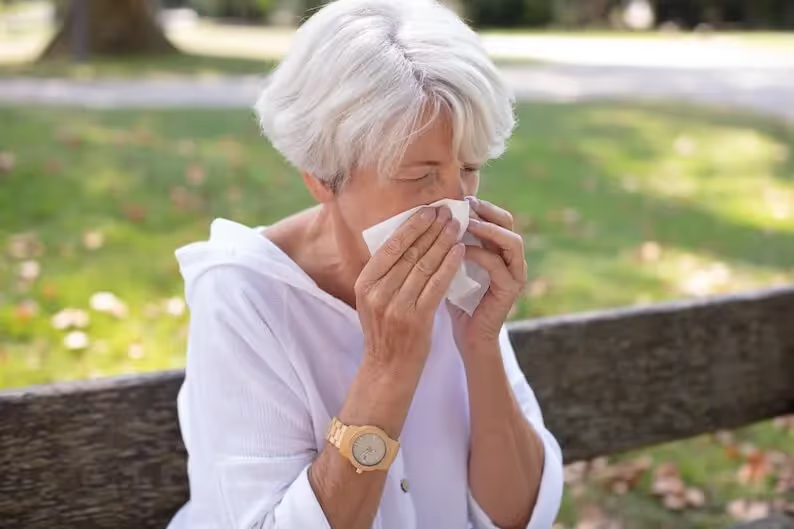Seasonal allergies, also called hay fever, cause more than just sneezing and a runny nose. If you have a long-term health condition, allergies can make your symptoms worse during certain seasons. Let's explore how seasonal allergies affect chronic conditions. But first, you need to know when allergy season is. And, then, what causes allergy symptoms and how to manage them.
When Is Allergy Season?
Allergy season depends on the type of allergens that trigger your symptoms.
- Spring: Tree pollen is the main cause of pollen allergy symptoms. It can trigger sneezing, itchy eyes, and a stuffy nose. Tree pollen is common in early spring. Even a little exposure to these outdoor allergens can cause problems.
- Summer: Grass pollen is the biggest trigger. People who have allergies to grass pollen may suffer from sneezing, a runny nose, and watery eyes. Managing symptoms during summer activities is important.
- Early Fall:Ragweed pollens are the main issue. These tiny particles travel far and cause sneezing, itchy eyes, and other seasonal allergy symptoms. Even if you live in a city, ragweed pollen can still affect you.
- Winter: Indoor allergens become more of a problem. Pet dander, dust mites, and mold can trigger symptoms like a stuffy nose and sneezing. Keeping your windows closed and using HEPA filters can help reduce exposure.
How Seasonal Allergies Affect Chronic Conditions
If you have a chronic condition like asthma, migraines, or fibromyalgia, seasonal allergies can make your symptoms worse. Here's how:
- Asthma: Tree, grass, and weed pollens can trigger asthma attacks or make breathing harder. A stuffy nose and inflamed airways from allergies can make asthma worse.
- Migraines: A stuffy nose and sinus pressure from allergies can lead to more headaches. Allergies can increase the number and intensity of migraines.
- Chronic Pain: If you have arthritis or fibromyalgia, allergies can increase inflammation. This makes pain worse. Managing symptoms is key to feeling better.
Common Allergy Triggers
Seasonal and indoor allergens cause most allergy symptoms:
- Outdoor Allergens: Tree pollen, grass pollen, and ragweed pollens can cause sneezing, a runny nose, and itchy eyes.
- Indoor Allergens: Pet dander, dust mites, and mold can trigger year-round symptoms. Keep windows closed. Wash bedding often. Use HEPA filters to reduce exposure.
How to Treat and Manage Seasonal Allergies
Managing seasonal allergy symptoms can improve your overall health. Here are some ways to treat and manage allergies:
- Nasal Sprays:These can reduce a runny nose and help with nasal congestion. Both prescription and over-the-counter options are available.
- HEPA Filters:Use HEPA filters in your home. They trap pet dander, dust mites, and other allergens. This helps keep indoor air cleaner.
- Allergy Shots:Also called immunotherapy, allergy shots can help your body become less sensitive to allergens like tree pollen and ragweed pollens.
- Medications:Antihistamines and decongestants can relieve sneezing, itchy eyes, and a stuffy nose. Newer antihistamines cause less drowsiness and are safe for daily use.
- Lifestyle Changes:Keep windows closed during high pollen times. Shower after being outside to remove pollen from your skin and hair. Vacuum often to remove dust mites and pet dander.
Proactive Prevention and Long-Term Management
Taking simple steps can help you manage symptoms year-round:
- Monitor Pollen Levels: Check pollen forecasts and avoid going outside when pollen counts are high. Weather apps often provide daily pollen updates.
- Reduce Indoor Allergens: Use dust mite-proof covers on pillows and mattresses. Keep pets out of the bedroom. Clean damp areas to prevent mold growth.
- Create a Safe Home Environment: Use dehumidifiers to control humidity. Clean air ducts to prevent dust circulation. Keep windows closed to block outdoor allergens.
- Stick to Your Treatment Plan: Use nasal sprays, allergy shots, and medications as directed. Following your treatment plan helps manage symptoms better.
Allergy Management Tips for People with Chronic Conditions
If you have a chronic condition, managing seasonal allergies requires extra care. Here are some tips:
- Stay Hydrated: Be sure to drink enough water. Strive for at least eight glasses a day. Drinking water helps thin mucus and relieve sinus pressure.
- Exercise Indoors: Create a space inside where you can work out. Avoid outdoor exercise during high pollen seasons to reduce exposure.
- Consult Your Doctor: Work with your provider to adjust your treatment plan during allergy season. Remember – each season is different. You may need different treatment in the spring than in the fall. Your doctor can recommend the best options to manage symptoms.
Seasonal allergies can be tough. As are chronic conditions. But by understanding how they are connected, you can take steps to feel better. Just by making small changes, you can find relief. Know your triggers and use the right treatment. That will make a big difference. And with the right care, you can enjoy better health all year long.




